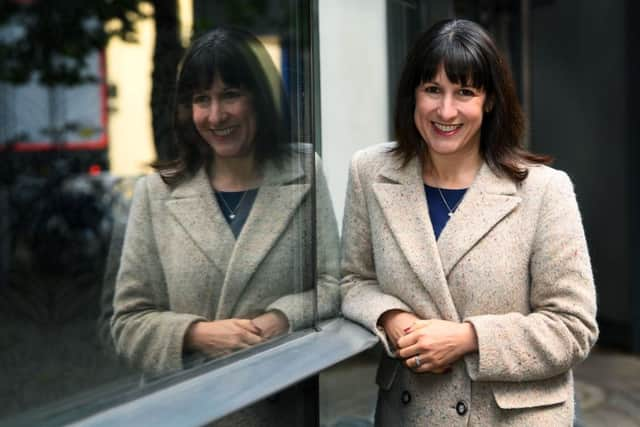Why calls are growing for revolutionary changes in the auditing sector


Every time a major company implodes, we hear the same questions. What were the auditors doing? Were they asleep at the wheel? How can we stop this type of corporate catastrophe from happening again?
Policymakers have cast a critical eye over the quality of auditing following the demise of the likes of Carillion and Thomas Cook. The entire profession could be about to witness revolutionary changes.
Advertisement
Hide AdAdvertisement
Hide AdEarlier this year, the Business, Energy and Industrial Strategy Committee called for the full structural break-up of the “Big Four” firms into audit and non-audit businesses.


The report also highlighted the lack of competition in the audit market. In 2016-17, the Big Four – EY, PwC, KPMG and Deloitte – accounted for 97 per cent of FTSE 350 audits and 99 per cent of FTSE 100 audits. The report recommended a segmented market cap and the use of joint audits, on a pilot basis, for the most complex audits to help the challenger firms secure more work.
Rachel Reeves MP, the chair of the Business, Energy and Industrial Strategy Committee, was scathing in her assessment of the current auditing landscape. She said: “The Big Four’s dominance has fostered a precarious market which shuts out challengers and delivers audits which investors and the public cannot rely on.
“For the big firms, audits seem too often to be the route to milking the cash-cow of consultancy business. The client relationship, and the conflicts of interest which abound, undermine the professional scepticism needed to deliver reliable, high-quality audits.”
Advertisement
Hide AdAdvertisement
Hide AdThe Competition and Markets Authority (CMA) recently published its final report, with recommendations to address “serious competition problems” in the UK audit industry.
The CMA is recommending the separation of auditing from consulting services, mandatory ‘‘joint audit’’ to enable firms outside the “Big Four” to develop the capacity needed to review the UK’s biggest companies, and the introduction of statutory regulatory powers to increase accountability of companies’ audit committees.
CMA chairman Andrew Tyrie said: “People’s livelihoods, savings and pensions all depend on the auditors’ job being done to a high standard. But too many fall short – more than a quarter of big company audits are considered sub-standard by the regulator. This cannot be allowed to continue.
“The Government now has three reports to hand. In large part, they come to similar conclusions. Conflicts of interest cannot be allowed to persist; nor can the UK afford to rely on only four firms to audit Britain’s biggest companies any longer. Early action will require legislation – hence the CMA’s proposals.” Ms Reeves, the Labour MP for Leeds West, continues to be frustrated by the Government’s failure to implement the CMA’s findings. She told Yorkshire Vision: “The big issue is the poor audit quality.” She said she believed the number of high-profile business failures, such as Carillion and Thomas Cook, should act as “a wake-up call to the Government that they need to reform the system”.
Advertisement
Hide AdAdvertisement
Hide AdShe accused the Government of sitting on the CMA’s report and failing to take decisive action.
Dr Alan Duboisée de Ricquebourg, a lecturer in accounting and finance at Leeds University Business School, said the Big Four are “fiercely resisting” proposals to break up their firms.
He added: “While such proposals may improve the public perception of auditor independence, it is hard to see how an operational split would lead to any real changes in audit quality. Existing regulations already impose strict rules concerning the nature and extent of non-audit services that may be provided by auditors to most of their large clients.”
While there has been a recent rise in the number of high-profile corporate failures, so far there is little evidence that any of these failures are directly associated with the auditor’s provision of non-audit services to these companies, said Mr Duboisée de Ricquebourg. “So, why break up their audit and consulting businesses?” he said. “In a word: competition. “Currently, most large company audit tenders are a two-horse race, the incumbent being disqualified due to audit tenure rules, and the firm providing consulting work being disqualified due to independence rules.
Advertisement
Hide AdAdvertisement
Hide Ad“A structural split of the audit and consultancy businesses of the largest audit firms would have the effect of adding a third horse into this race with the hope of driving up audit quality through increased competition.”
Tougher regulation, and a more independent and authoritative regulator, is certainly part of the answer, said Mr Duboisée de Ricquebourg.
But should we also increase the capability of challenger firms through segmented market share caps and the piloting of joint audits?
“Joint audits would arguably be costly and time-consuming to implement and there is little evidence to suggest that using two auditors would unequivocally improve audit quality,’ said Mr Duboisée de Ricquebourg.
Advertisement
Hide AdAdvertisement
Hide Ad“By contrast, market share caps could be implemented within the next two years, and would have a greater chance of improving audit quality through the increased competition in the audit market. But, this will only be effective if it is carefully managed by ensuring that the Big Four firms don’t cherry-pick the least risky and most profitable clients.”
Many analysts believe we should end conflicts of interest by splitting audit and non-audit services. Others believe cooling-off periods should also be imposed.
“I would recommend a full structural break-up of the audit and consultancy businesses in the large audit firms,” said Mr Duboisée de Ricquebourg. He added: “An operational split would fail to go much further than what is already being achieved through existing regulation.”
A Department for Business, Energy and Industrial Strategy spokesman said: “A strong and competitive audit market is crucial to confidence in business – and we are committed to bringing forward reforms to ensure the UK continues to be a world leader in audit and accounting services. Work has already started to reform and bolster the regulator as a key part of this, with a strong new leadership team taking up their positions earlier this month.” The spokesman stressed that the creation of a new regulator, the ‘Audit, Reporting and Governance Authority’’, was announced in response to the independent review of the Financial Reporting Council by Sir John Kingman.
Advertisement
Hide AdAdvertisement
Hide AdThe spokesman added: “This will have a new mandate, new leadership and stronger powers. Sir Jonathan Thompson took up post as CEO and Simon Dingemans took up post as chair this month
“The Government’s consultation on the CMA proposals was published on 18th July and closed on 13th September. We are currently analysing the responses. Primary legislation will be required to implement some of the potential audit reforms and will be brought forward when Parliamentary time allows.”
Spokesmen for the Big Four said they were committed to reforms that would boost audit quality.
A PWC spokesman said that breaking up the firms would not solve these issues.
Advertisement
Hide AdAdvertisement
Hide AdThe spokesman added: “In June, PwC launched a wide-ranging package of measures aimed at ensuring we deliver consistently high-quality audits. This includes investing an additional £30m per year in training, people and technology and hiring 500 more experienced auditors.”
Euan West, the office senior partner at KPMG in Leeds, said: “We welcome many aspects of the CMA’s recommendation to introduce increased separation.
“We are working on creating a model which gives our audit practice greater independence from the rest of the business whilst ensuring our clients continue to benefit from the advantages of working with a multi-disciplinary firm. Actions we have already taken include ceasing the provision of non-audit services to the FTSE350 companies we audit and introducing new governance.”
An EY spokesman said: “We disagree with proposals that call for an operational or structural split in the UK as this would undermine the multidisciplinary model and risk unintended consequences to audit quality. EY believes that audit quality must remain central to any reforms of the UK audit market.”
Advertisement
Hide AdAdvertisement
Hide AdSimon Cleveland, head of public policy and regulation at Deloitte, said: “We believe that audit quality is considerably enhanced by the investment capacity and access to specialists that being part of a much larger and diverse multi-disciplinary firm allows.” Deloitte’s proposals include introducing temporary market share caps allowing challenger firms to quickly scale their capabilities and creating a new audit governance framework, with an independent chair, majority non-executive board, oversight of audit quality and remuneration and public and regulatory disclosures.